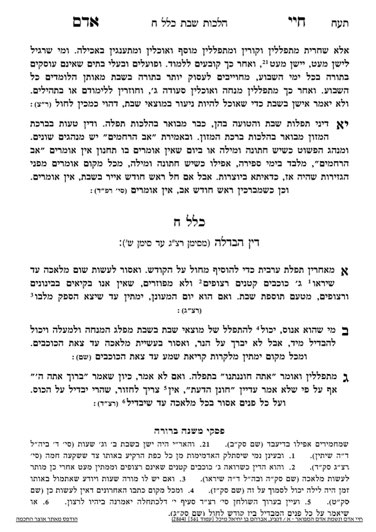The current series is available for sponsorship. Please contact Rabbi Reingold for more information.
We are continuing in siman 1, where the Chayei Adam discusses waiting for the zman on Motzai Shabbos. The Chayei Adam writes that if it is a cloudy day, a person should wait until they are certain it is the proper zman. We mentioned from the Mishnah Berurah that one may rely on a clock or a chart which tells them the zman and does not have to visually discern three stars. If so, on a cloudy day, one may rely on their chart even though without it, they would have to wait extra time until they would be certain it is the proper zman.
If a person does not have a chart, and does not have access to the information, the rule of the Chayei Adam will apply.
In siman 2, the Chayei Adam writes that if a person has a pressing need, they can daven maariv for motzai Shabbos from plag hamincha on Shabbos day, just like any other night during the week. It is a machlokes when the zman for maariv begins, and one opinion is plag hamincha. There are two common scenarios where maariv is davened after plag. One is when making early Shabbos. The other is shuls which daven maariv right after sunset, which are actually relying on the opinion that one can daven maariv after plag (because, according to the other opinion, the zman maariv is tzeis hakochavim, so sunset does not help).
Over here, the Chayei Adam is adding that one can daven maariv on Shabbos itself. This is a greater chiddush than davening after plag during the week, because davening maariv signifies it is after Shabbos, but one will not be able to perform melacha until after tzeis hakochavim.
The Chayei Adam adds that not only can one daven maariv after plag, they can also recite havdalah on a kos. They would skip the bracha of borei meorei haeish, because it is melacha to light a candle, but otherwise they can recite the full havdalah. Either way, they may not perform melacha until tzeis hakochavim.
Additionally, the Chayei Adam writes that one should refrain from krias shema until tzeis hakochavim. The Shulchan Aruch and Mishnah Berurah understand that a person would only recite the maariv shemoneh esrei after plag, and birchos krias shema of maariv and krias shema of maariv are not recited until after tzeis. During Shacharis, we cannot separate between birchos krias shema and shemoneh esrei, because one has to be someich geulah l’tefillah (connect to shemoneh esrei). During maariv, we try to connect them but they can be separated as well. For example, if a person comes late to maariv, and walks in when the tzibbur is about to begin shemoneh esrei, they should recite shemoneh esrei with the rest of the tzibbur and they will recite birchos krias shema afterwards. Davening maariv after plag on Shabbos day would be another example of where the shemoneh esrei of maariv is separated from the birchos krias shema. Again, this is only done when a person has a need.
Thus, if a person has the option on motzai Shabbos of davening with a minyan that will begin before tzeis hakochavim and finish by tzeis hakochavim, or a minyan that does not begin until after tzeis hakochavim, they should wait to daven with the latter minyan. If a person has a need, they may daven before tzeis hakochavim, but to do so on a regular basis is clearly inappropriate.
Summary
- One may rely on a clock or chart when it is not possible to visualize three stars. However, if they do not have that information, and they are unable to visualize three stars, they must wait to perform melacha until there is no longer a safeik that tzeis hakochavim has passed.
- In situations of need, one may daven maariv on Shabbos from after plag. However, they would only daven shemoneh esrei, and birchos krias shema and shema would not be recited until after tzeis hakochavim.
- Additionally, they may make havdalah on a kos from after plag hamincha, with the exclusion of borei meorei ha’eish.
- Barring extenuating circumstances, one should not daven maariv before the zman on motzai Shabbos (tzeis hakochavim + tosefes).



